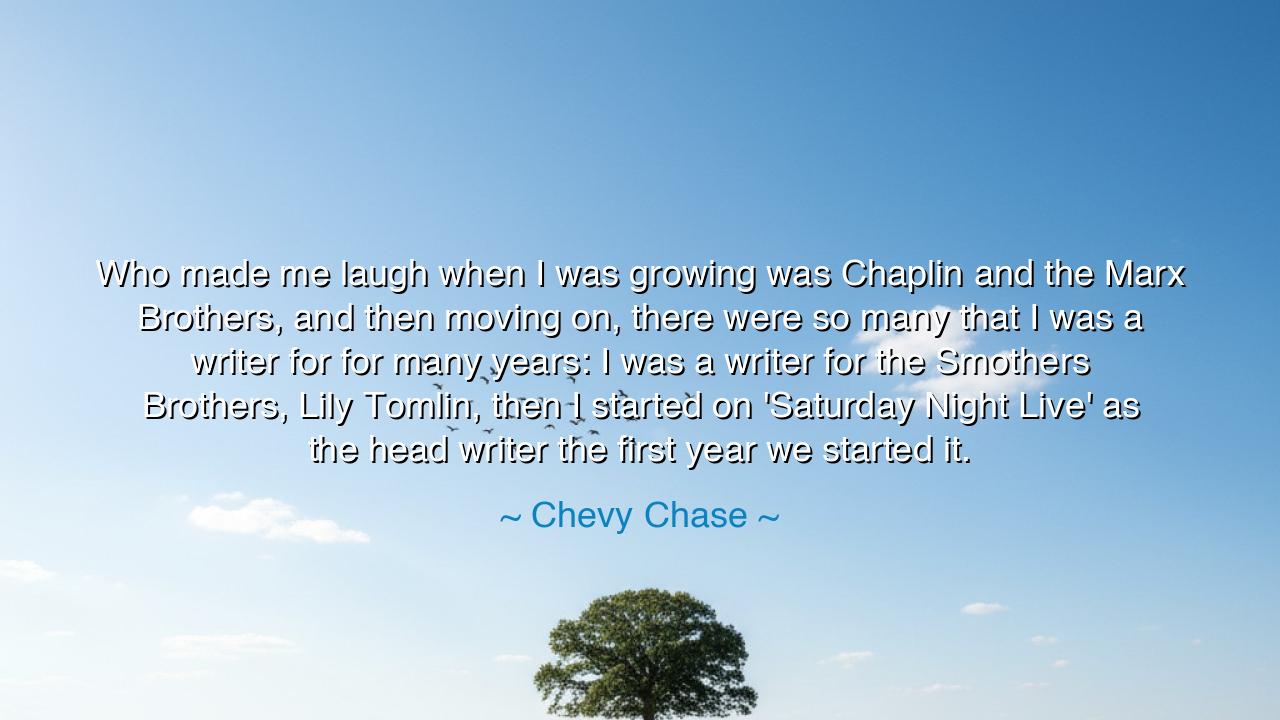
Who made me laugh when I was growing was Chaplin and the Marx
Who made me laugh when I was growing was Chaplin and the Marx Brothers, and then moving on, there were so many that I was a writer for for many years: I was a writer for the Smothers Brothers, Lily Tomlin, then I started on 'Saturday Night Live' as the head writer the first year we started it.






The words of Chevy Chase — “Who made me laugh when I was growing was Chaplin and the Marx Brothers, and then moving on, there were so many that I was a writer for for many years: I was a writer for the Smothers Brothers, Lily Tomlin, then I started on Saturday Night Live as the head writer the first year we started it.” — are not simply a reflection on comedy, but on the eternal cycle of inspiration and creation, of receiving and then giving back. In these words we hear the echo of the ancients: the teacher shapes the student, and the student, in turn, becomes the teacher. What once lifted the spirit of a child becomes the foundation upon which he builds to lift the spirits of others.
When Chase names Chaplin and the Marx Brothers, he names giants. These were not just men of laughter; they were alchemists who turned the struggles of their age into joy for millions. Chaplin, through silence and expression, gave voice to the poor, the wanderer, the forgotten. The Marx Brothers, through chaos and wit, mocked the powerful and turned nonsense into wisdom. To be shaped by their humor was to be shaped by a force that combined levity with truth, joy with critique. For laughter, in the hands of masters, becomes not mere entertainment but a mirror to the human soul.
Then Chase speaks of moving on, and here lies a deeper wisdom. Life is not only about receiving influence; it is about carrying it forward. The torch that once illuminated his youth became the flame he bore as a writer. His path was not a straight ascent but a series of transformations: writing for the Smothers Brothers, shaping the wit of Lily Tomlin, and finally helping to forge a cultural pillar in Saturday Night Live. Each stage was both an inheritance and an offering. What he had received in laughter, he gave back multiplied, reshaped for a new generation.
This pattern has unfolded throughout history. Consider the great philosopher Aristotle, who was shaped by Plato’s teaching, only to surpass him in breadth and system, and in turn became the teacher of Alexander the Great. Or think of the medieval scholars who preserved the works of the ancients and then, by adding their own voices, gave rise to the Renaissance. Always, the cycle continues: to be inspired is to owe a debt, and to repay it one must create, teach, or inspire others in turn. Chase’s words reflect this same eternal current.
The reference to Saturday Night Live is especially telling. What began as a modest experiment in late-night comedy grew into an institution, shaping generations of humor, satire, and cultural critique. And Chase, as one of its earliest architects, was part of a moment where inherited laughter from the past transformed into a new form of expression for the future. Just as Chaplin spoke through silent film, and the Marx Brothers through absurdist dialogue, so SNL spoke through sketch and satire, holding up the mirror to its own time.
The lesson is clear: do not think of yourself only as a receiver of gifts. What you admire, what inspires you, what makes you laugh or weep or dream — these are seeds planted within you. And the purpose of a seed is not to remain hidden, but to grow, to bear fruit, and to scatter new seeds for others. To live only as a consumer of greatness is to stop the flow of life; to live as both receiver and giver is to keep the current of creation alive.
Practical wisdom follows. Look to those who have inspired you — the voices, the artists, the teachers, the thinkers — and ask yourself: how am I carrying their gift forward? It need not be on a great stage; it may be in the quiet of your family, in the shaping of your work, in the laughter you share with a friend. Every act of creation or kindness is a way of repaying the debt. And when the time comes, be willing, as Chase was, to move on, to leave behind old roles in order to forge new paths where your voice can add to the chorus of history.
Thus, Chase’s words endure as a reminder of the cycle of inspiration: to be lifted is to lift, to be taught is to teach, to laugh is to create laughter. Do not hoard what you receive — transform it, pass it on, and keep the flame alive. For in this eternal rhythm, humanity not only remembers its past but continually renews its future.






AAdministratorAdministrator
Welcome, honored guests. Please leave a comment, we will respond soon